Olive Oil vs. Soybean Oil: Which Is Better?
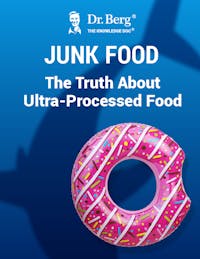
Junk Food: The Truth About Ultra-Processed Food
Learn about the detrimental impact of ultra-processed foods on health and well-being
Discover the top four dangerous hidden ingredients in everyday foods
Understand the health risks associated with consuming ultra-processed foods
Recognize misleading nutrition labels to make informed dietary choices
Get practical tips for choosing minimally processed whole foods for better health

Junk Food: The Truth About Ultra-Processed Food
Learn about the detrimental impact of ultra-processed foods on health and well-being
Discover the top four dangerous hidden ingredients in everyday foods
Understand the health risks associated with consuming ultra-processed foods
Recognize misleading nutrition labels to make informed dietary choices
Get practical tips for choosing minimally processed whole foods for better health

Junk Food: The Truth About Ultra-Processed Food
Learn about the detrimental impact of ultra-processed foods on health and well-being
Discover the top four dangerous hidden ingredients in everyday foods
Understand the health risks associated with consuming ultra-processed foods
Recognize misleading nutrition labels to make informed dietary choices
Get practical tips for choosing minimally processed whole foods for better health

Junk Food: The Truth About Ultra-Processed Food
Learn about the detrimental impact of ultra-processed foods on health and well-being
Discover the top four dangerous hidden ingredients in everyday foods
Understand the health risks associated with consuming ultra-processed foods
Recognize misleading nutrition labels to make informed dietary choices
Get practical tips for choosing minimally processed whole foods for better health

Junk Food: The Truth About Ultra-Processed Food
Learn about the detrimental impact of ultra-processed foods on health and well-being
Discover the top four dangerous hidden ingredients in everyday foods
Understand the health risks associated with consuming ultra-processed foods
Recognize misleading nutrition labels to make informed dietary choices
Get practical tips for choosing minimally processed whole foods for better health

Junk Food: The Truth About Ultra-Processed Food
Learn about the detrimental impact of ultra-processed foods on health and well-being
Discover the top four dangerous hidden ingredients in everyday foods
Understand the health risks associated with consuming ultra-processed foods
Recognize misleading nutrition labels to make informed dietary choices
Get practical tips for choosing minimally processed whole foods for better health

Junk Food: The Truth About Ultra-Processed Food
Learn about the detrimental impact of ultra-processed foods on health and well-being
Discover the top four dangerous hidden ingredients in everyday foods
Understand the health risks associated with consuming ultra-processed foods
Recognize misleading nutrition labels to make informed dietary choices
Get practical tips for choosing minimally processed whole foods for better health

Junk Food: The Truth About Ultra-Processed Food
Learn about the detrimental impact of ultra-processed foods on health and well-being
Discover the top four dangerous hidden ingredients in everyday foods
Understand the health risks associated with consuming ultra-processed foods
Recognize misleading nutrition labels to make informed dietary choices
Get practical tips for choosing minimally processed whole foods for better health

Junk Food: The Truth About Ultra-Processed Food
Learn about the detrimental impact of ultra-processed foods on health and well-being
Discover the top four dangerous hidden ingredients in everyday foods
Understand the health risks associated with consuming ultra-processed foods
Recognize misleading nutrition labels to make informed dietary choices
Get practical tips for choosing minimally processed whole foods for better health

Junk Food: The Truth About Ultra-Processed Food
Learn about the detrimental impact of ultra-processed foods on health and well-being
Discover the top four dangerous hidden ingredients in everyday foods
Understand the health risks associated with consuming ultra-processed foods
Recognize misleading nutrition labels to make informed dietary choices
Get practical tips for choosing minimally processed whole foods for better health

Junk Food: The Truth About Ultra-Processed Food
Learn about the detrimental impact of ultra-processed foods on health and well-being
Discover the top four dangerous hidden ingredients in everyday foods
Understand the health risks associated with consuming ultra-processed foods
Recognize misleading nutrition labels to make informed dietary choices
Get practical tips for choosing minimally processed whole foods for better health

Junk Food: The Truth About Ultra-Processed Food
Learn about the detrimental impact of ultra-processed foods on health and well-being
Discover the top four dangerous hidden ingredients in everyday foods
Understand the health risks associated with consuming ultra-processed foods
Recognize misleading nutrition labels to make informed dietary choices
Get practical tips for choosing minimally processed whole foods for better health

Junk Food: The Truth About Ultra-Processed Food
Learn about the detrimental impact of ultra-processed foods on health and well-being
Discover the top four dangerous hidden ingredients in everyday foods
Understand the health risks associated with consuming ultra-processed foods
Recognize misleading nutrition labels to make informed dietary choices
Get practical tips for choosing minimally processed whole foods for better health

Junk Food: The Truth About Ultra-Processed Food
Learn about the detrimental impact of ultra-processed foods on health and well-being
Discover the top four dangerous hidden ingredients in everyday foods
Understand the health risks associated with consuming ultra-processed foods
Recognize misleading nutrition labels to make informed dietary choices
Get practical tips for choosing minimally processed whole foods for better health

Junk Food: The Truth About Ultra-Processed Food
Learn about the detrimental impact of ultra-processed foods on health and well-being
Discover the top four dangerous hidden ingredients in everyday foods
Understand the health risks associated with consuming ultra-processed foods
Recognize misleading nutrition labels to make informed dietary choices
Get practical tips for choosing minimally processed whole foods for better health

Junk Food: The Truth About Ultra-Processed Food
Learn about the detrimental impact of ultra-processed foods on health and well-being
Discover the top four dangerous hidden ingredients in everyday foods
Understand the health risks associated with consuming ultra-processed foods
Recognize misleading nutrition labels to make informed dietary choices
Get practical tips for choosing minimally processed whole foods for better health

Junk Food: The Truth About Ultra-Processed Food
Learn about the detrimental impact of ultra-processed foods on health and well-being
Discover the top four dangerous hidden ingredients in everyday foods
Understand the health risks associated with consuming ultra-processed foods
Recognize misleading nutrition labels to make informed dietary choices
Get practical tips for choosing minimally processed whole foods for better health

Junk Food: The Truth About Ultra-Processed Food
Learn about the detrimental impact of ultra-processed foods on health and well-being
Discover the top four dangerous hidden ingredients in everyday foods
Understand the health risks associated with consuming ultra-processed foods
Recognize misleading nutrition labels to make informed dietary choices
Get practical tips for choosing minimally processed whole foods for better health

Junk Food: The Truth About Ultra-Processed Food
Learn about the detrimental impact of ultra-processed foods on health and well-being
Discover the top four dangerous hidden ingredients in everyday foods
Understand the health risks associated with consuming ultra-processed foods
Recognize misleading nutrition labels to make informed dietary choices
Get practical tips for choosing minimally processed whole foods for better health

4 Dangerous Ingredients to Avoid – Wallet Cutout Card
Identify harmful ingredients hidden in processed foods
Learn to recognize and identify these ingredients on food labels
Get a practical wallet cutout for quick reference while shopping or dining out

4 Dangerous Ingredients to Avoid – Wallet Cutout Card
Identify harmful ingredients hidden in processed foods
Learn to recognize and identify these ingredients on food labels
Get a practical wallet cutout for quick reference while shopping or dining out

4 Dangerous Ingredients to Avoid – Wallet Cutout Card
Identify harmful ingredients hidden in processed foods
Learn to recognize and identify these ingredients on food labels
Get a practical wallet cutout for quick reference while shopping or dining out

4 Dangerous Ingredients to Avoid – Wallet Cutout Card
Identify harmful ingredients hidden in processed foods
Learn to recognize and identify these ingredients on food labels
Get a practical wallet cutout for quick reference while shopping or dining out

4 Dangerous Ingredients to Avoid – Wallet Cutout Card
Identify harmful ingredients hidden in processed foods
Learn to recognize and identify these ingredients on food labels
Get a practical wallet cutout for quick reference while shopping or dining out

4 Dangerous Ingredients to Avoid – Wallet Cutout Card
Identify harmful ingredients hidden in processed foods
Learn to recognize and identify these ingredients on food labels
Get a practical wallet cutout for quick reference while shopping or dining out

4 Dangerous Ingredients to Avoid – Wallet Cutout Card
Identify harmful ingredients hidden in processed foods
Learn to recognize and identify these ingredients on food labels
Get a practical wallet cutout for quick reference while shopping or dining out

4 Dangerous Ingredients to Avoid – Wallet Cutout Card
Identify harmful ingredients hidden in processed foods
Learn to recognize and identify these ingredients on food labels
Get a practical wallet cutout for quick reference while shopping or dining out

4 Dangerous Ingredients to Avoid – Wallet Cutout Card
Identify harmful ingredients hidden in processed foods
Learn to recognize and identify these ingredients on food labels
Get a practical wallet cutout for quick reference while shopping or dining out

4 Dangerous Ingredients to Avoid – Wallet Cutout Card
Identify harmful ingredients hidden in processed foods
Learn to recognize and identify these ingredients on food labels
Get a practical wallet cutout for quick reference while shopping or dining out

4 Dangerous Ingredients to Avoid – Wallet Cutout Card
Identify harmful ingredients hidden in processed foods
Learn to recognize and identify these ingredients on food labels
Get a practical wallet cutout for quick reference while shopping or dining out

4 Dangerous Ingredients to Avoid – Wallet Cutout Card
Identify harmful ingredients hidden in processed foods
Learn to recognize and identify these ingredients on food labels
Get a practical wallet cutout for quick reference while shopping or dining out

4 Dangerous Ingredients to Avoid – Wallet Cutout Card
Identify harmful ingredients hidden in processed foods
Learn to recognize and identify these ingredients on food labels
Get a practical wallet cutout for quick reference while shopping or dining out

4 Dangerous Ingredients to Avoid – Wallet Cutout Card
Identify harmful ingredients hidden in processed foods
Learn to recognize and identify these ingredients on food labels
Get a practical wallet cutout for quick reference while shopping or dining out

4 Dangerous Ingredients to Avoid – Wallet Cutout Card
Identify harmful ingredients hidden in processed foods
Learn to recognize and identify these ingredients on food labels
Get a practical wallet cutout for quick reference while shopping or dining out

4 Dangerous Ingredients to Avoid – Wallet Cutout Card
Identify harmful ingredients hidden in processed foods
Learn to recognize and identify these ingredients on food labels
Get a practical wallet cutout for quick reference while shopping or dining out

4 Dangerous Ingredients to Avoid – Wallet Cutout Card
Identify harmful ingredients hidden in processed foods
Learn to recognize and identify these ingredients on food labels
Get a practical wallet cutout for quick reference while shopping or dining out

4 Dangerous Ingredients to Avoid – Wallet Cutout Card
Identify harmful ingredients hidden in processed foods
Learn to recognize and identify these ingredients on food labels
Get a practical wallet cutout for quick reference while shopping or dining out

4 Dangerous Ingredients to Avoid – Wallet Cutout Card
Identify harmful ingredients hidden in processed foods
Learn to recognize and identify these ingredients on food labels
Get a practical wallet cutout for quick reference while shopping or dining out
Olive oil vs. soybean oil—which option is the healthier oil?
While both are popular cooking oils, olive oil stands out as a much healthier option due to its rich content of monounsaturated fatty acids and antioxidants that help support various critical bodily functions.
Let's look at the key differences between olive oil and soybean oil and discover why you should always choose extra virgin olive oil to support a healthy body.
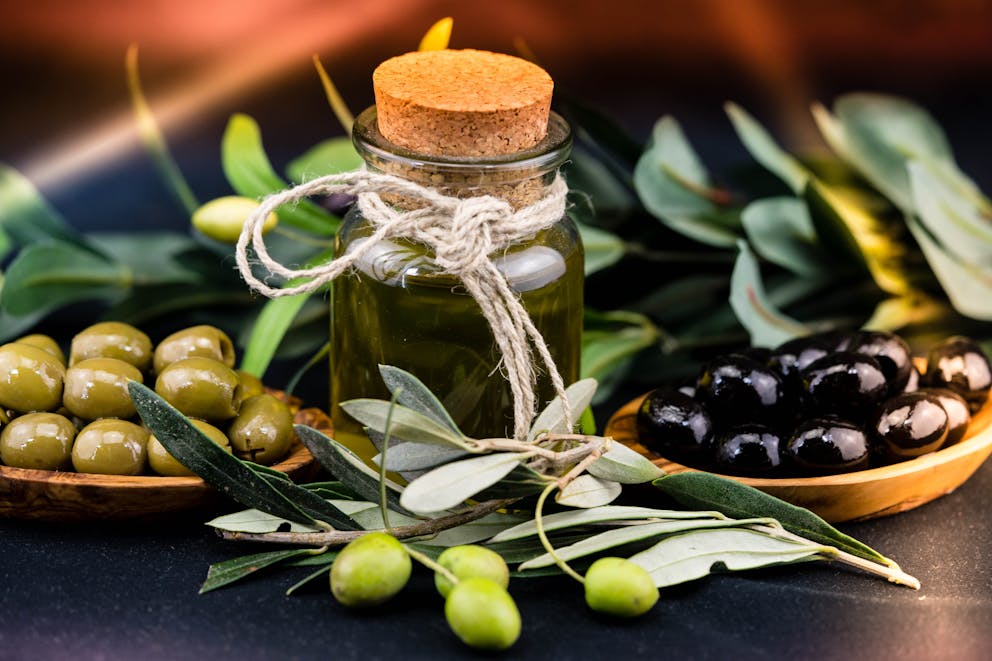
Olive oil
Olive oil is one of humanity’s oldest and most revered culinary ingredients, with its recorded use dating as far back as the Bronze Age.
Extra virgin olive oil (EVOO) is traditionally cold-pressed and is considered the healthiest variety. This process helps preserve the health-promoting compounds in fresh olives without contaminating the oil with chemicals or causing oxidizing due to high temperatures.
EVOO is a rich source of antioxidants, polyphenols, vitamin E, hydroxytyrosol, omega-3 fatty acids, and healthy monounsaturated fats, all of which contribute to olive oil's potent anti-inflammatory properties.
In addition, EVOO contains oleocanthal, a unique phenolic compound that, according to research published in Nature, exhibits anti-inflammatory properties similar to those of the nonsteroidal anti-inflammatory drug (NSAID) ibuprofen.
Although olive oil can be used for a wide range of culinary applications, it isn’t recommended for high-temperature cooking.
While it’s widely believed that olive oil has a smoke point ranging from 325°F (163°C) to 400°F (204°C), recent studies have found a significant degradation of EVOO at much lower temperatures.
Research published in Antioxidants indicates that heating EVOO to 248°F (120°C) can reduce its polyphenol concentrations by up to 40 percent.
In addition, sautéing EVOO at 338°F (170°C) has been shown to increase this reduction to as much as 75 percent, significantly diminishing its health benefits.
Therefore, to maximize the nutritional advantages of EVOO, it’s best enjoyed in cold dishes such as salads, dips, dressings, or drizzled overcooked vegetables.
Watch the video below to learn why olive oil is healthier than soybean oil.
Olive Oil is the Best, Soybean Oil is the Worst!
Soybean oil
Soybean oil is a popular cooking oil extracted from the seeds of the soybean plant. It has become one of the most widely consumed vegetable oils worldwide due to its cost-effective manufacturing, shelf stability, and versatile applications.
Soybean oil is commonly used in processed foods, margarine, salad dressings, snack items, and desserts. Its mild flavor and high smoke point make it a popular cooking oil for frying and baking.
Soybean oil production includes extensive refining techniques, such as solvent-based extraction, high-heat processing, bleaching, and deodorization.
While this process effectively maximizes oil yield, it can significantly diminish nutrient content and introduce harmful byproducts.
Additionally, soybean oil contains large amounts of polyunsaturated fatty acids, including omega-6 fats. While essential in small quantities, excessive intake of omega-6 fats can cause inflammation and an increased risk of chronic disease.
Olive oil vs. soybean oil
When comparing olive oil and soybean oil, olive oil is significantly better for overall health.
Olive oil is rich in antioxidants such as vitamin E and monounsaturated fats, including oleic acid. This health-promoting fatty acid has been linked to several health benefits, including a reduced risk of heart disease and improved cholesterol levels.
According to a study published in Free Radical Biology and Medicine, olive oil consumption is an effective dietary strategy for managing metabolic syndrome (MetS), a condition characterized by insulin resistance, high blood pressure, obesity, and dyslipidemia.
The study largely attributed olive oil's benefits to its high oleic acid and polyphenol concentrations, which help improve lipid profiles, enhance cellular antioxidant capacity, and reduce inflammation.
Conversely, soybean oil has been associated with adverse metabolic effects. Research published in Frontiers in Microbiology found that diets high in soybean oil “induced gut dysbiosis in mice, leading to steatosis, hepatic inflammation, and impaired glucose homeostasis.”
These findings underscore the potential health risks associated with excessive soybean oil consumption, which has been shown to exacerbate inflammation and contribute to metabolic disorders.
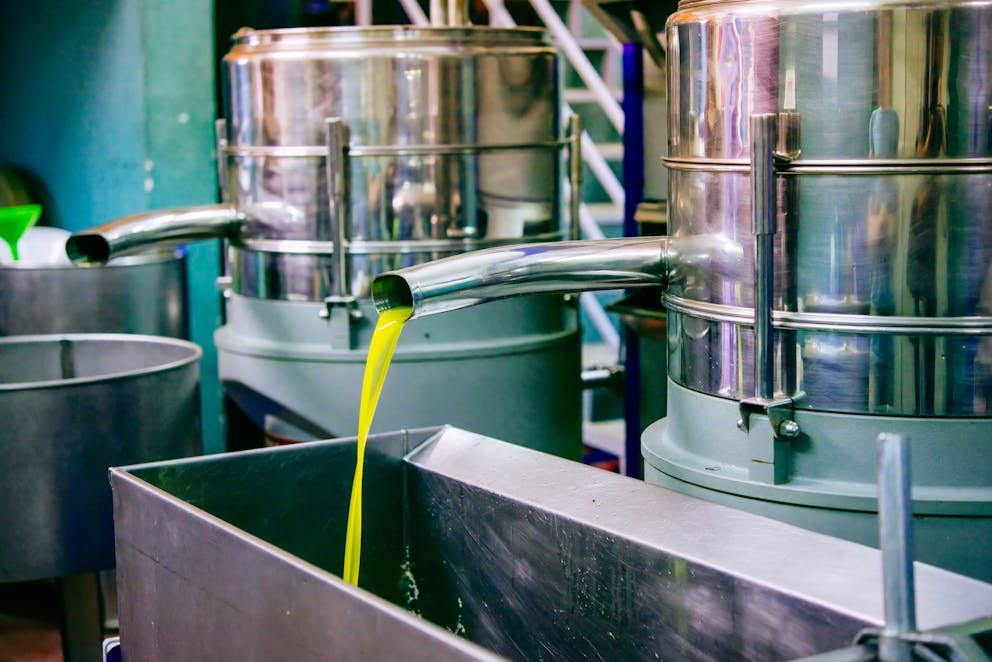
How to choose a healthy olive oil
When selecting olive oil, opt for cold-pressed EVOO that has been certified organic and non-genetically modified (GMO).
Cold-pressed oils are extracted without heat or chemicals, preserving their natural benefits.
Choosing organic, non-GMO olive oil helps ensure that the olives are grown without synthetic pesticides or genetic modifications, resulting in a purer and healthier product.
Be cautious of vaguely marked products. Terms such as pure olive oil or extra light olive oil often indicate highly refined olive oils that have undergone heat and chemical processing to remove impurities and improve shelf life.
Refining can strip away beneficial nutrients and introduce unwanted chemicals such as hexane, a potentially harmful substance linked to various health risks.
High-quality olive oils typically display a harvest date, indicating when the olives were picked and pressed. Fresher oils offer better flavor and higher nutrient content.
Additionally, it's advisable to consume olive oil within 12 to 18 months of the harvest date for optimal quality.
Guidelines established by the International Olive Council recommend storing olive oil in a cool, dark place, away from heat and light, with an ideal temperature range of 55°F (13°C) to 77°F (25°C).
Exposure to light and heat can accelerate oxidation, leading to diminished flavor and reduced health benefits.
It's worth noting that olive oil begins to degrade once opened due to oxygen exposure, which explains why it’s recommended to use the oil within 30 to 60 days after opening.
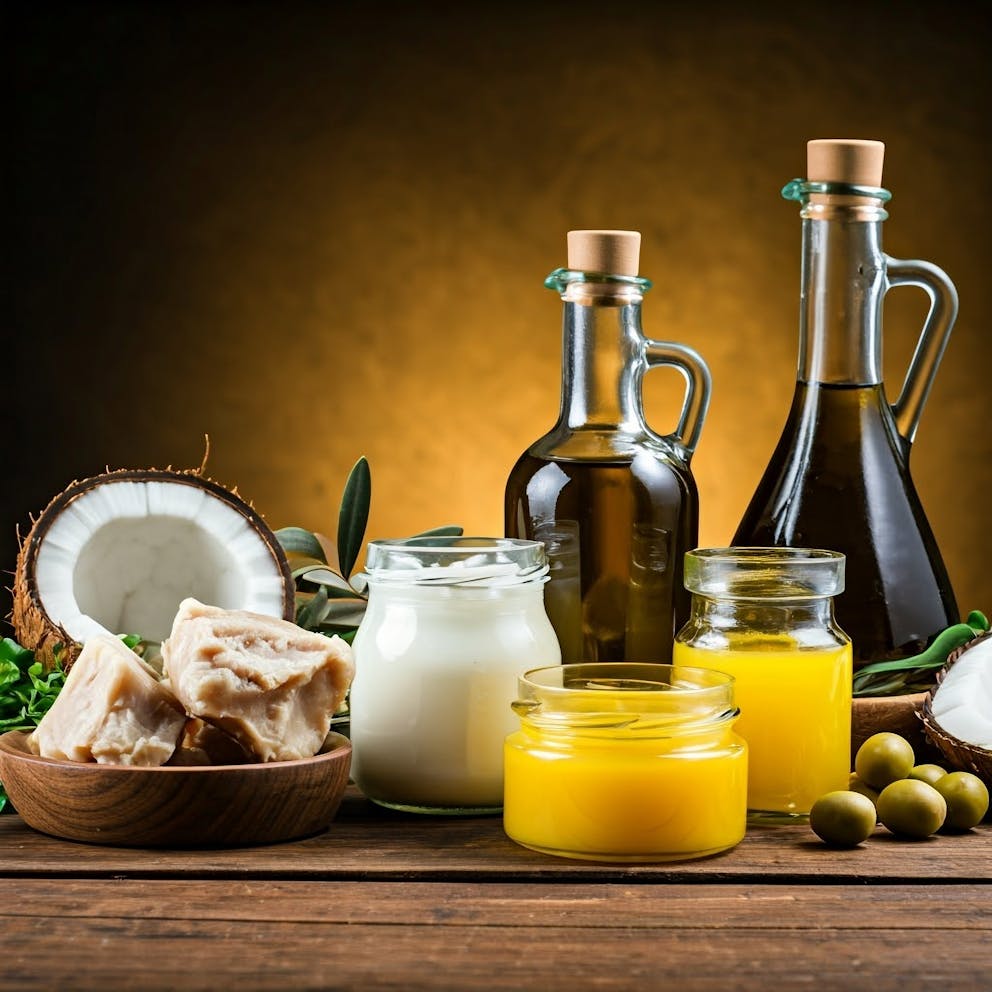
Alternatives to soybean oil for deep frying
When selecting oils for deep frying, it’s crucial to choose options that remain stable at high temperatures to prevent oxidation, which alters the flavor and can create harmful byproducts.
In addition to soybean oil, avoid other highly processed unsaturated oils such as canola, corn, cottonseed, sunflower, safflower, and peanut oil.
“These highly processed unsaturated oils oxidize easily when heated, leading to the formation of advanced lipid oxidation end products (ALEs),” explains Dr. Berg, “These can negatively impact heart health and may even increase the risk of certain cancers.”
Here are three healthy alternatives to soybean oil for deep frying.
1. Avocado oil
Avocado oil has a high smoke point and a neutral flavor, making it an excellent alternative for deep frying.
It’s rich in healthy monounsaturated fats such as oleic acid and can withstand temperatures up to 520°F (271°C) without significant oxidation.
2. Ghee
Also known as clarified butter, ghee doesn’t contain milk solids, leaving a pure fat that’s much more resistant to oxidation than butter.
Ghee, with a smoke point of around 485°F (252°C), is an excellent option for high-temperature cooking and adds a rich buttery flavor to fried foods.
3. Grass-fed tallow
Tallow, rendered from beef fat, is a traditional fat stable at high temperatures with a smoke point of around 400°F (204°C).
For optimal health benefits, choose grass-fed tallow over grain-fed tallow, as it contains more health-promoting nutrients including fat-soluble vitamins and conjugated linoleic acid (CLA).
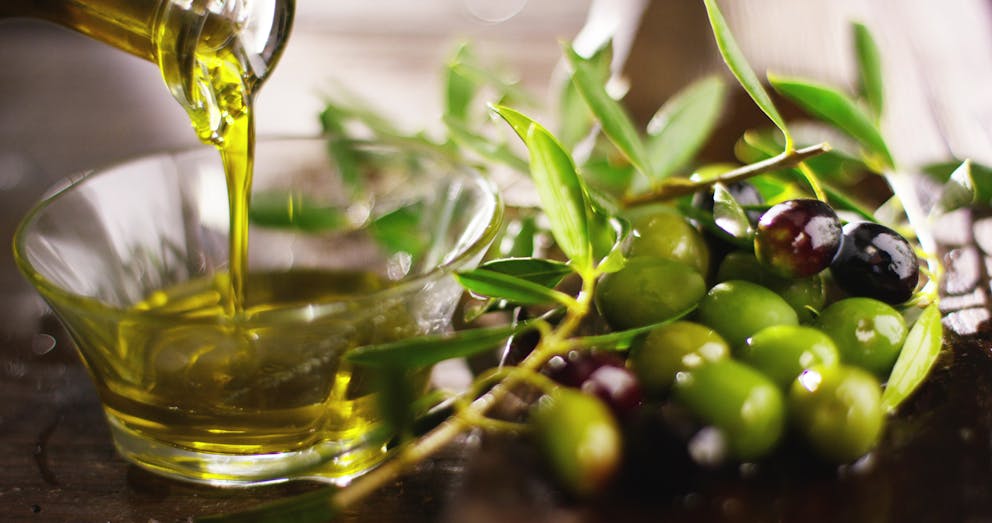
Key takeaways
Olive oil vs. soybean oil—which one is better?
Extra virgin olive oil (EVOO) is the better choice due to its rich nutritional profile of monounsaturated fats, antioxidants, and polyphenols, which provide anti-inflammatory benefits and promote overall health.
To get the best quality EVOO, choose cold-pressed, certified organic, and non-GMO options with a recent harvest date and ensure proper storage away from heat and light sources for maximum health benefits and optimal flavor.
FAQ
1. Olive oil vs. soybean oil: which is best?
Olive oil is a better option than soybean oil as it’s minimally processed and contains high concentrations of healthy monounsaturated fats and antioxidants.
While cheaper, soybean oil is high in polyunsaturated fats and heavily processed, which may contribute to inflammation and the development of metabolic imbalances.
2. Which oil is the healthiest?
Extra virgin olive oil is a healthier option than soybean oil. While soybean oil may be more affordable, it’s heavily processed and lacks nutritional value, making it a less desirable choice for those prioritizing health and nutrition.
Other healthy cooking oils include avocado oil, coconut oil, ghee, and grass-fed tallow.
3. What is the healthiest oil for deep frying?
Avocado oil, ghee, or grass-fed beef tallow are excellent fats for deep frying as they have high smoke points. This enables them to withstand high temperatures before breaking down or producing harmful compounds.
Additionally, these options are healthy sources of saturated fat, which support hormone production and brain health.
4. What is the worst oil to cook with?
Oils high in polyunsaturated fats, such as soybean oil, canola oil, corn oil, sunflower oil, peanut oil, and sesame oil, are less stable and can form harmful oxidation compounds when heated.
Additionally, these oils are often heavily processed, involving high-temperature heating and exposure to harmful chemicals, which can contaminate your food when used for cooking.
Sources
Previous blog
Metabolic Syndrome Is Caused by High Fat Storing HormoneNext blog
Lactose Intolerant and ProbioticsTags

Popular
08/21/2024
55.1K views
02/23/2025
46.5K views
11/18/2024
278.5K views
03/18/2024
11/21/2022




